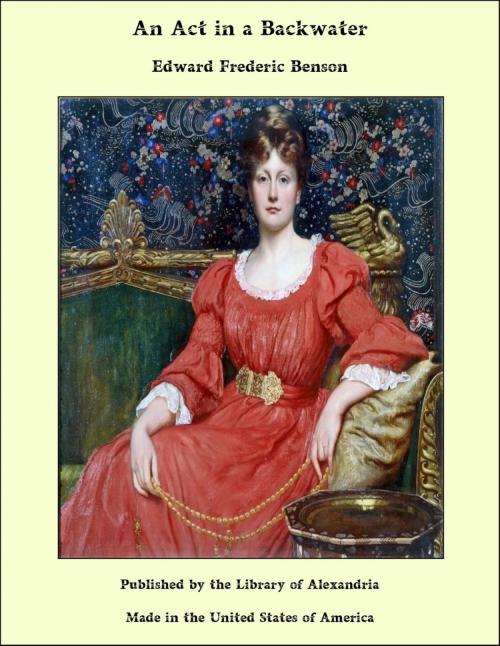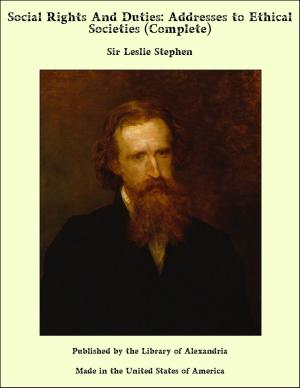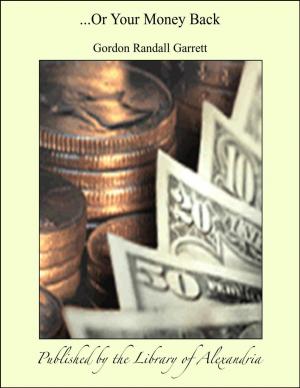| Author: | Edward Frederic Benson | ISBN: | 9781465619969 |
| Publisher: | Library of Alexandria | Publication: | March 8, 2015 |
| Imprint: | Language: | English |
| Author: | Edward Frederic Benson |
| ISBN: | 9781465619969 |
| Publisher: | Library of Alexandria |
| Publication: | March 8, 2015 |
| Imprint: | |
| Language: | English |
It was approaching half-past five on a June afternoon, and in consequence Colonel Raymond was approaching the Wroxton County Club. He was a man of method, and a retired Colonel of Volunteers, and thus he left his house (christened Lammermoor by his wife) with great regularity at a quarter past five in summer, and a quarter past four in winter, and marched rather than walked with an inflated chest and a gallant bearing. The Colonel, even at the age of fifty-six, remained one of those harmless idiots who draw themselves up and try to look interesting whenever a pretty woman passes them; indeed, he went further, for, being a little short-sighted, he drew himself up and tried to look interesting when he saw any female figure approaching, on the chance that at nearer range she might prove to be pretty. He had a somewhat flaming face, and a long mustache “silver sabled.” In very hot weather he was liable to touches of liver, and when thus afflicted, sometimes alluded, when only comparative strangers were present, to the trying climate of India, a country in which, as his intimate acquaintances knew, he had never set foot. But to the uninitiate the combination of the title of Colonel and the climate of India led to the deduction that he had seen service, and the Colonel did not put himself to the pains of correcting this. He would even encourage it further by sometimes talking of lunch as “tiffin.” Now Colonel Raymond’s manner was so radically bluff and straightforward that it would be absurd to argue any want of sincerity from such trifles. Every man he met was either “the best fellow on this earth,” or “a blackguard, sir, a low Radical blackguard!” Shades and fine distinctions did not exist for him; there was no nonsense about him, he would say. But there was very little sense. The Colonel had his idols. Dizzy, “old Dizzy,” was one of them, and this full measure of his approbation was conferred on the Queen when old Dizzy was created an Earl, for the aristocracy was another. His wife’s sister had married a man whose sister had married Lord Avesham, and had this fortunate peer known it, he must have often been gratified to have heard himself alluded to by the Colonel as “my noble relative.” His noble relative was President of the Wroxton County Club, toward which the Colonel was now marching; but on the few occasions on which his lordship had set foot in that establishment, the Colonel, if there, had speedily effaced himself, only to come in half an hour afterward with the avowed object of looking for him, and much regret at having missed him. He had once even gone so far as to address a note to Lord Avesham, with a few formal lines inside and his own name very large on the left-hand corner of the envelope. This he left conspicuously in the rack which held members’ letters, with “To await arrival” in the corner. But from some reason or other (Lord Avesham had been seen in Wroxton several times that week) the Colonel surreptitiously removed it the day after. Perhaps he thought that he would certainly meet his noble relative in the street, and could ask him to tiffin then.
It was approaching half-past five on a June afternoon, and in consequence Colonel Raymond was approaching the Wroxton County Club. He was a man of method, and a retired Colonel of Volunteers, and thus he left his house (christened Lammermoor by his wife) with great regularity at a quarter past five in summer, and a quarter past four in winter, and marched rather than walked with an inflated chest and a gallant bearing. The Colonel, even at the age of fifty-six, remained one of those harmless idiots who draw themselves up and try to look interesting whenever a pretty woman passes them; indeed, he went further, for, being a little short-sighted, he drew himself up and tried to look interesting when he saw any female figure approaching, on the chance that at nearer range she might prove to be pretty. He had a somewhat flaming face, and a long mustache “silver sabled.” In very hot weather he was liable to touches of liver, and when thus afflicted, sometimes alluded, when only comparative strangers were present, to the trying climate of India, a country in which, as his intimate acquaintances knew, he had never set foot. But to the uninitiate the combination of the title of Colonel and the climate of India led to the deduction that he had seen service, and the Colonel did not put himself to the pains of correcting this. He would even encourage it further by sometimes talking of lunch as “tiffin.” Now Colonel Raymond’s manner was so radically bluff and straightforward that it would be absurd to argue any want of sincerity from such trifles. Every man he met was either “the best fellow on this earth,” or “a blackguard, sir, a low Radical blackguard!” Shades and fine distinctions did not exist for him; there was no nonsense about him, he would say. But there was very little sense. The Colonel had his idols. Dizzy, “old Dizzy,” was one of them, and this full measure of his approbation was conferred on the Queen when old Dizzy was created an Earl, for the aristocracy was another. His wife’s sister had married a man whose sister had married Lord Avesham, and had this fortunate peer known it, he must have often been gratified to have heard himself alluded to by the Colonel as “my noble relative.” His noble relative was President of the Wroxton County Club, toward which the Colonel was now marching; but on the few occasions on which his lordship had set foot in that establishment, the Colonel, if there, had speedily effaced himself, only to come in half an hour afterward with the avowed object of looking for him, and much regret at having missed him. He had once even gone so far as to address a note to Lord Avesham, with a few formal lines inside and his own name very large on the left-hand corner of the envelope. This he left conspicuously in the rack which held members’ letters, with “To await arrival” in the corner. But from some reason or other (Lord Avesham had been seen in Wroxton several times that week) the Colonel surreptitiously removed it the day after. Perhaps he thought that he would certainly meet his noble relative in the street, and could ask him to tiffin then.















